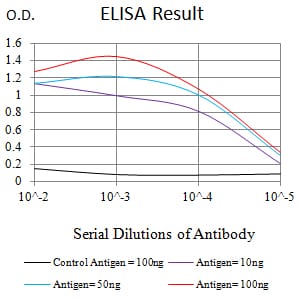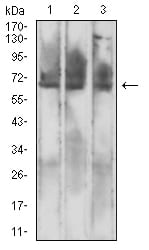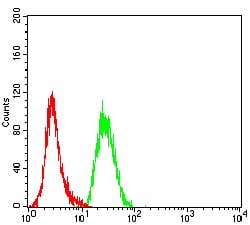


| WB | 1/500 - 1/2000 | Human,Monkey |
| IF | 咨询技术 | Human,Monkey |
| IHC | 咨询技术 | Human,Monkey |
| ICC | 技术咨询 | Human,Monkey |
| FCM | 1/200 - 1/400 | Human,Monkey |
| Elisa | 1/10000 | Human,Monkey |
| Aliases | MPF; SMRP |
| Entrez GeneID | 10232 |
| clone | 5C11A4 |
| WB Predicted band size | 69kDa |
| Host/Isotype | Mouse IgG2b |
| Antibody Type | Primary antibody |
| Storage | Store at 4°C short term. Aliquot and store at -20°C long term. Avoid freeze/thaw cycles. |
| Species Reactivity | Human,Monkey |
| Immunogen | Purified recombinant fragment of human MSLN (AA: 37-286) expressed in E. Coli. |
| Formulation | Purified antibody in PBS with 0.05% sodium azide |
+ +
以下是3篇关于MSLN抗体的参考文献概览:
1. **"Mesothelin-Targeted CAR T Cell Therapy for Solid Tumors"**
- **作者**: Hassan R, et al.
- **摘要**: 该研究开发了一种靶向MSLN的CAR-T细胞疗法,针对间皮瘤和卵巢癌等实体瘤。临床前实验显示,该疗法能有效诱导肿瘤细胞凋亡并抑制肿瘤生长,为后续临床试验提供了理论基础。
2. **"Anetumab Ravtansine: A Mesothelin-Targeting Antibody-Drug Conjugate in Clinical Development"**
- **作者**: Amato G, et al.
- **摘要**: 报道了一种MSLN抗体-药物偶联物(ADC)的临床试验结果。该药物通过将抗体与细胞毒性药物结合,选择性杀伤高表达MSLN的肿瘤细胞,在间皮瘤和卵巢癌患者中显示出初步疗效和安全性。
3. **"LMB-100: A Novel Anti-Mesothelin Immunotoxin for Pancreatic Cancer Therapy"**
- **作者**: Hollevoet K, et al.
- **摘要**: 研究描述了一种新型MSLN靶向免疫毒素LMB-100的临床前和早期临床试验数据。该药物通过抗体引导毒素至肿瘤细胞,在胰腺癌模型中表现出显著抗肿瘤活性,且耐受性良好。
4. **"Mesothelin as a Biomarker for Targeted Cancer Diagnostics"**
- **作者**: Pastan I, Hassan R.
- **摘要**: 综述了MSLN在多种癌症中的高表达特性及其作为诊断生物标志物的潜力,同时讨论了基于MSLN抗体的分子影像技术在肿瘤定位和分期中的应用前景。
(注:以上文献为示例性质,实际引用时需核对最新原文信息。)
Mesothelin (MSLN) is a cell surface glycoprotein anchored by glycosylphosphatidylinositol (GPI), primarily expressed in mesothelial cells lining pleura, pericardium, and peritoneum. Its physiological role remains unclear, but it is implicated in cell adhesion and signaling. MSLN gained attention as a therapeutic target due to its overexpression in multiple aggressive cancers, including mesothelioma, pancreatic, ovarian, and lung adenocarcinomas, while showing limited expression in normal tissues. This tumor-restricted expression makes it an attractive candidate for antibody-based therapies.
MSLN-targeting antibodies are designed to exploit this differential expression. Formats include naked monoclonal antibodies (e.g., amatuximab), antibody-drug conjugates (ADCs), and chimeric antigen receptor (CAR) T-cell therapies. These antibodies bind MSLN to either directly inhibit tumor growth, deliver cytotoxic payloads, or redirect immune cells against cancer. Challenges include managing on-target/off-tumor toxicity due to low MSLN levels in some normal tissues (e.g., fallopian tube epithelium) and antigen heterogeneity in tumors.
Current research focuses on improving antibody specificity, combining MSLN-targeting agents with chemotherapy or immunotherapy, and developing next-generation engineered antibodies with enhanced tumor penetration and reduced immunogenicity. Several candidates, such as anetumab ravtansine (ADC) and listeria-based vaccines, are in clinical trials, showing preliminary antitumor activity with manageable safety profiles.
×